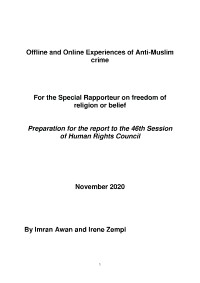https://tandis.odihr.pl/handle/20.500.12389/23095
| DC Field | Value | |
|---|---|---|
| Authors | Zempi, Irene | |
| Authors | Awan, Imran | |
| Country Coverage | UN region | |
| Accessioned Date | 2024-04-30T15:30:43Z | |
| Availability Date | 2024-04-30T15:30:43Z | |
| Issue Date | 2020-11 | |
| URI | http://hdl.handle.net/20.500.12389/23095 | |
| Abstract | "This report is a joint collaboration with the authors, Professor Imran Awan and Dr Irene Zempi, and Tell MAMA. The overall aim of this report is to examine the impacts of online and offline anti-Muslim hate crime. The report concludes with a list of key recommendations that participants suggested to us, which we describe as the ‘victims charter’. The reports principle findings are as follows: Both online and offline incidents are a continuity of anti-Muslim hate and thus should not be examined in isolation. Participants described living in fear because of the possibility of online threats materialising in the ‘real world’. The prevalence and severity of online and offline anti-Muslim hate crimes are influenced by ‘trigger’ events of local, national and international significance. The visibility of people’s Muslim identity is key to triggering both online and offline anti-Muslim hate crime. Muslim women are more likely to be attacked in comparison to Muslim men, both in the virtual world and in the physical world. Victims of both online and offline anti-Muslim crime suffer from depression, emotional stress, anxiety and fear. The victims of online anti-Muslim hate crime remain less ‘visible’ in the criminal justice system. Muslim men are unlikely to report an incident of anti-Muslim abuse for fear of being viewed as ‘weak’. Recommendations 1. Anti-Muslim Hate must be challenged from within Muslim communities. The report found that participants would like the community to speak out against the hate crime that they suffer. 2. Media training around reporting stories to do with Muslims. The media must portray a more balanced viewpoint when discussing Muslim stories as this could impact upon the way they are viewed by wider society. 3. The police can work better to improve the way in which they handle cases of anti-Muslim hate crime. Participants who reported incidents to the police felt that they were not taken seriously. 4. The public should intervene and assist victims of anti-Muslim hate. Victims do not necessarily want physical action but just a phone call to assist the police. 5. Anti-Muslim hate crime awareness and visibility. Better awareness of what a hate crime is and what things people can do to help reassure them and build confidence. 6. Social media companies should make their systems of reporting hate crime more user friendly. Social media companies can do much more to help tackle online prejudice and bigotry through specific systems that help victims report anti-Muslim hate crime. 7. Diversity in the Criminal Justice System. A more diverse criminal justice system with people of all backgrounds could help assist in breaking down barriers that might exist for victims reporting anti-Muslim hate crime. 8. Challenging the language and engaging schools in the debate. To tackle anti-Muslim prejudice seriously then we need to start to at schools and begin challenging the language and engaging schools in the debate." | |
| Format | ||
| Language | en | |
| Publisher | OHCHR | |
| Subject Keywords | Muslims | |
| Subject Keywords | gender | |
| Subject Keywords | hate crime | |
| Subject Keywords | victims | |
| Subject Keywords | women | |
| Title | Offline and Online Experiences of Anti-Muslim crime. For the Special Rapporteur on freedom of religion or belief [Preparation for the report to the 46th Session of Human Rights Council] | |
| Material Type | thematic report | |
| Meeting Title | 46th Session of Human Rights Council | |
| Corporate Contributor | Birmingham City University | |
| Corporate Contributor | Nottingham Trent University | |
| Corporate Contributor | TellMAMA | |
| Key Issues | Gender based discrimination | |
| Key Issues | Hate crime | |
| Key Issues | Intolerance against Muslims | |
| Meeting Place | UN | |
| Physical Description | 9 p. | |
| Meeting Date | 22-23 March 2021 | |
| URL more information | https://www.ohchr.org/sites/default/files/Documents/Issues/Religion/Islamophobia-AntiMuslim/Civil%20Society%20or%20Individuals/ProfAwan-3.pdf | |
| See Also | civil society | |
| See Also | stereotype | |
| See Also | hate speech | |
| See Also | victim support | |
| Fulltext | With Fulltext | |
| Fulltext Grant | open | |
| Appears in Collections: | Documents Resources on addressing gender-based intolerance and hate crime against Muslims | |
Files in This Item:
| File | Description | Size | Format | |
|---|---|---|---|---|
| 23095_EN.pdf | English | 464.29 kB | Adobe PDF |  |

